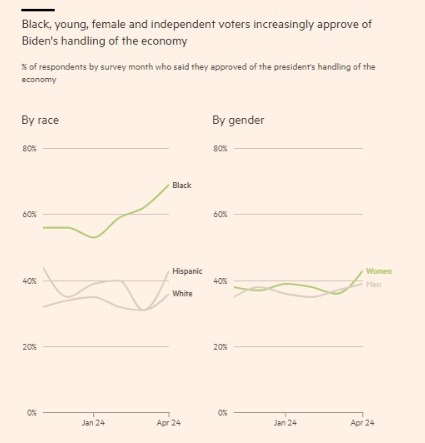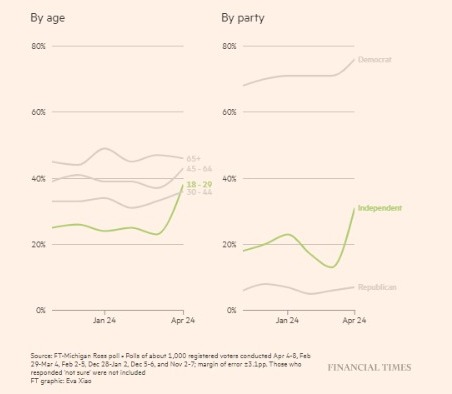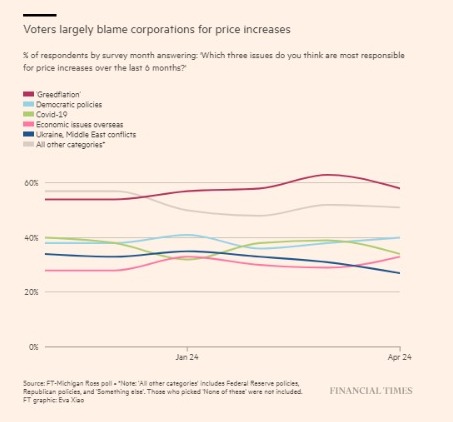
FT-Michigan Ross Poll Reveals President’s Earnings Could Be Hampered by Fears About High Prices
The number of American voters who approve of Joe Biden’s handling of the economy is increasing, but concerns about inflation, including rising fuel prices, could derail his re-election bid, according to a new poll.
The latest monthly poll conducted for the Financial Times and the University of Michigan’s Ross School of Business found that 41 percent of registered voters said they approved of Biden’s handling of the economy.
That’s a five-point jump from the previous month, when just 36% said they approved, and the highest approval rating since pollsters began asking the question in November.
Biden’s overall approval rating rose to 43%, four points higher than in March and another record high since the monthly poll began.
But while Biden has improved his standing with younger voters, women, independents and black and Hispanic voters in particular since last month’s vote, it highlights warning signs for the president.
The survey revealed that 41% of voters trusted Donald Trump more than Biden on the economy, compared to 35% who preferred the president. Sixteen percent of registered voters said they did not trust either man to manage the economy.
At the same time, the survey showed that inflation continues to weigh on voter sentiment. The latest official data, released last week, showed a 3.5% rise in consumer prices in the year to March, higher than economists expected.
Nearly four in five voters cited price increases as one of their biggest sources of financial stress, and nearly three in four said food prices were having the “biggest impact” on their financial situation. The FT-Michigan Ross poll also revealed a sharp increase in the number of Americans who said the cost of gasoline was hitting their wallets, with 52 percent saying it had a major impact on their financial situation, compared to 47 percent last month.
In early April, the US Energy Information Administration raised its monthly forecast for retail gasoline prices, citing rising wholesale gasoline and crude oil prices. Rising gasoline prices also play an important role in monthly variations in inflation, according to official data released last week.


Still, the findings will be welcomed by Biden, who has faced persistently low approval ratings, particularly in the way he manages the economy, even as the US benefits from relatively strong growth and a robust job market.
“Voters are as concerned about inflation as ever, but they blame Biden less,” said Erik Gordon, a professor at the University of Michigan’s Ross School of Business. “Mr. Biden’s recent and more strident accusations that greedy companies are responsible for price increases appear to have earned him points.”
The poll also suggested that voters across the political spectrum were open to supporting third-party candidates. Although No Labels, the bipartisan group that attempted to present an independent “unity ticket,” dropped its candidacy earlier this month, several third-party candidates, including environmental lawyer Robert F. Kennedy Jr, academic Cornel West and Green Party activist Jill Stein are still seeking ballot access in states across the country.
Nearly half – 46 percent – of voters and two-thirds of independents said they would consider voting for a third-party candidate.
The latest poll, however, showed that the majority of voters supported a range of actions and policy proposals from the Biden administration. Asked about the Justice Department’s recent decision to sue Apple, alleging that the technology giant was using its power to crush competition and limit consumer choice in smartphones, nearly three-quarters of voters said the big technology groups have too much power.
Separately, asked whether they support the Biden administration’s latest proposals to increase taxes on companies and high-income individuals, almost two-thirds said they supported the idea. If enacted, the policy would require billionaires to pay at least a quarter of their income in taxes and would increase the corporate tax rate from 21% to 28%.

The FT-Michigan Ross poll was conducted online by Democratic strategists Global Strategy Group and Republican polling firm North Star Opinion Research between April 4-8. It reflects the opinions of 1,010 registered voters nationwide and has a margin of error of plus or minus 3.1 percentage points.
Financial Times article.
Source: https://www.ocafezinho.com/2024/04/16/o-indice-de-aprovacao-de-joe-biden-sobre-a-economia-esta-aumentando-entre-os-eleitores-dos-eua/

